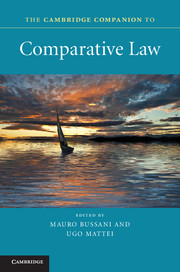Book contents
- Frontmatter
- Contents
- Contributors
- Abbreviations
- Preface
- Part I Knowing comparative law
- Part II Comparative law fields
- 6 Comparative studies in private law
- 7 Comparative administrative law
- 8 Comparative constitutional law
- 9 Comparative criminal justice
- 10 Comparative civil justice
- 11 Comparative law and international organizations
- Part III Comparative law in the flux of civilizations
- Index
- References
7 - Comparative administrative law
Published online by Cambridge University Press: 05 May 2013
- Frontmatter
- Contents
- Contributors
- Abbreviations
- Preface
- Part I Knowing comparative law
- Part II Comparative law fields
- 6 Comparative studies in private law
- 7 Comparative administrative law
- 8 Comparative constitutional law
- 9 Comparative criminal justice
- 10 Comparative civil justice
- 11 Comparative law and international organizations
- Part III Comparative law in the flux of civilizations
- Index
- References
Summary
Overview
The field of administrative law is inextricably bound to two phenomena that trace their origins to the nineteenth century: the rise of large state bureaucracies designed to fulfil a complex array of societal needs and the development of liberal democratic norms of social organization and public authority. Much of administrative law can be understood as an attempt to work out the tension inherent in these two phenomena: the recognition that the attainment of public purposes is contingent on a cadre of full-time employees, paid by the public purse and loyal to the state, and, at the same time, the belief that public authority is legitimate only if embedded in democratic politics and liberal societies. To put it more succinctly, these are the objectives, on the one hand, of neutrality and expertise, and, on the other hand, of democracy and liberal rights.
The common aspiration of making public administration both capable and accountable serves as the springboard for the comparative analysis in this chapter. I begin with a discussion of what, in the law, is taken to be the hallmark of modern bureaucracy – the legal guarantees of civil service employment – together with national variations in the professionalization of administration and contemporary efforts to cut back on civil service guarantees. I then turn to three important types of accountability: the contestation of administrative action before the courts, the involvement of organized interests in administrative policymaking, and informal accountability to the general public through parliamentary ombudsmen and transparency guarantees. These categories serve as a framework for exploring the similarities and differences that shape contemporary administrative law systems. The chapter concludes with the increasingly important phenomenon of the globalization of administrative law and the rapid migration of administrative principles across legal systems throughout the world, both national and international. In line with the intellectual purpose of this volume, I have omitted topics that have traditionally been considered peripheral to the field or that fall at the intersection with other disciplines, for instance the constitutional powers of the executive branch over public administration and the empowerment of private groups through self-regulation, and refer the reader to the bibliography at the end of the chapter for guidance.
- Type
- Chapter
- Information
- The Cambridge Companion to Comparative Law , pp. 145 - 170Publisher: Cambridge University PressPrint publication year: 2012
References
- 16
- Cited by

